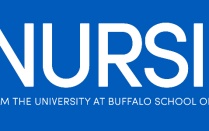Here is how we "save" a Million Hearts One Beat at Time
Published September 1, 2016 This content is archived.
Every 43 seconds, someone in the United States has a heart attack.
The shocking statistic is one of many that led faculty in the School of Nursing to join Million Hearts®, a nationwide initiative to prevent 1 million heart attacks and strokes by 2017. The school’s goal: to save 1,000 hearts in Western New York.
Parishioners of the Lincoln Memorial United Methodist Church in Buffalo were among the first members of the community to benefit from the effort. The new screening program led by nursing faculty and students as part of the initiative has been implemented in partnership with Millennium Collaborative Care and Greater Buffalo United Ministries. Students and faculty travel to churches, clinics and health fairs, all in underserved areas, to check blood pressures, body mass index, and cholesterol levels and to perform stress screenings of community members.

One community member, Charley H. Fisher III, noted, “I went through all the screenings and evaluations and I think it showed that there’s some work to be done on my part.” He expressed his plan to exercise more after receiving his results.
For hundreds of guests like Fisher III, nursing students will provide health education, recommend aspirin therapy to patients based on screening results, and offer guidance on smoking cessation and stress reduction. After the screenings, Millennium Collaborative Care helps participants check their eligibility for Medicaid or other health insurance and find a primary care providers.
“The mission of the School of Nursing is to promote the health and wellness of our local communities. This collaboration is an opportunity for the students and faculty to live the mission of the school,” says Susan Grinslade, PhD, RN, PHCNS-BC, assistant dean for undergraduate programs in the UB School of Nursing.
“Engaging in this initiative provides an opportunity to promote the health and well-being of Buffalo inner city residents who may have limited access to health care and health promotion.”
The Million Hearts initiative, led by the Centers for Disease Control and Prevention (CDC) and Centers for Medicare and Medicaid Services, was created to fight the rise of heart disease and stroke, the first and fifth leading causes of death in the United States. On average, one American dies from stroke every four minutes. Together, the diseases account for a third of all deaths in the nation, according to Million Hearts.
Health care is going to be about community and population health, and looking at the bigger picture.
- Dianne Loomis, DNP, RN, FNP-C
Like the rest of the country, heart disease plagues Buffalo too. Over the course of 30 years, Kinzer Mark Pointer has conducted 708 funerals. When Pointer, pastor of Agape Fellowship Baptist Church in Buffalo, reviewed the causes of death for his parishioners – many of whom are African American – he found a common thread of eight chronic diseases: cancer, diabetes, hypertension, cerebrovascular disease, emphysema, substance abuse, HIV and, the leader, heart disease.
“I discovered that about 70 percent of the people who I buried had died prematurely according to the CDC’s expectation of lifespan for Americans,” says Pointer, who discovered that the average age of death for his members was 61 years old.
“When you look at the rate at which African Americans die and at the rate that the rest of the population dies, it’s wildly disparate. We die a lot sooner and a lot more assuredly when we get chronic diseases.”
The realization led Pointer and other local pastors to create Greater Buffalo United Ministries, a faith-based initiative to minimize health disparities in Western New York whose membership includes 58 churches.

The initial screening events took place during the spring semester and marked the first major event partnering UB School of Nursing with the Greater Buffalo United Ministries and Millennium Collaborative Care, an organization serving Western New York’s eight counties that is dedicated to reducing avoidable hospital use.
The School of Nursing’s decision to join Million Hearts began with a class, “Health Promotion and Disease Prevention within Populations.” The course, led by nursing Clinical Associate Professors Dianne Loomis, DNP, FNP-BC, and Loralee Sessanna, DNS, RN, CNS, AHN-BC, was designed to teach students how to improve health outcomes among underserved populations that face health disparities.
“Right now, the majority of their clinical experiences are hospital based. And that’s not the way health care is going to be. Health care is going to be about community and population health, and looking at the bigger picture,” says Loomis. A service learning component was added to enhance the student’s learning experiences.

“Individual behaviors are important, but unless we change the community, and create opportunities for the community to improve their health, we’re going to have poor outcomes.”
The School of Nursing has incorporated this initiative into the curriculum for both its traditional and accelerated undergraduate students in order to provide continuity and follow-up screening for those in the community, as well as to provide the students with opportunities for more clinical experiences within our community.
-MARCENE ROBINSON
Past Issues
We want to hear from our incredible alumni. Whether you live in Western New York or anywhere else in the world, stay in touch! Send us a class note.

